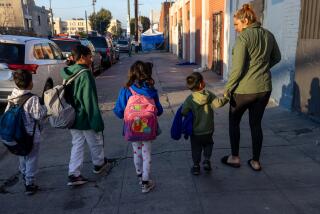ANAHEIM : $196,000 Awarded, Will Help Plan Ways to Fight Gangs
- Share via
The city of Anaheim and The Cambodian Family, a nonprofit social service organization in Santa Ana, were awarded a total of $196,000 in federal grants to plan methods of fighting gangs and youth violence, the Department of Health and Human Services announced Friday.
The two were among just 21 recipients across the U.S. that shared $2 million in federal money handed out to cities, schools and community groups by HHS Secretary Donna Shalala.
The money will be used to identify the developmental needs of children ages 9 to 12 who are vulnerable to becoming gang members and to develop a five-year plan of action to help the children and their families resist gang involvement, officials said.
The Cambodian Family, which was formed in 1982 to help residents of Santa Ana’s crime-plagued Minnie Street neighborhood, will receive $100,000. The Anaheim city government will receive more than $96,000 and will focus its efforts on the following neighborhoods: Jeffrey/Lynne, Avon/Dakota, Guinida Lane and Haster/Orangewood.
Steve Swaim, superintendent of Community Services for Anaheim, said Friday the city’s plan will go beyond gang sweeps and neighborhood rehabilitation. Instead, it will focus on trying to prevent kids from becoming involved in gangs in the first place.
“The idea is to spend a few resources up front on prevention rather than spending money after the fact to arrest and incarcerate these kids,” Swaim said.
In developing the plan, city staff--who will be hired with the grant money--will spend part of the next year in the neighborhoods to receive advice at public forums from residents, apartment owners, school staff, religious leaders and officials of nonprofit organizations.
Swaim said the research will focus on children with low self-esteem, peer pressure and problems in the home--all “risk factors” that lead to gang involvement, he said.
“We want to help parents and families really protect their kids and rid them of some of these risk factors,” Swaim said. “We think this really could be the answer.”
The Cambodian Family will take a similar approach in the Minnie Street neighborhood, where about 12,000 low-income people live in overcrowded conditions.
“The idea is to change the community so the kids can grow up in a safe and nonviolent way and have the opportunity to develop the positive sides of themselves,” said Rifka Hirsch, the organization’s executive director.
Once the plans are developed, they must be approved by the U.S. Department of Health and Human Services before they are funded. The groups could each receive as much as $750,000 annually for five years.
More to Read
Sign up for Essential California
The most important California stories and recommendations in your inbox every morning.
You may occasionally receive promotional content from the Los Angeles Times.













